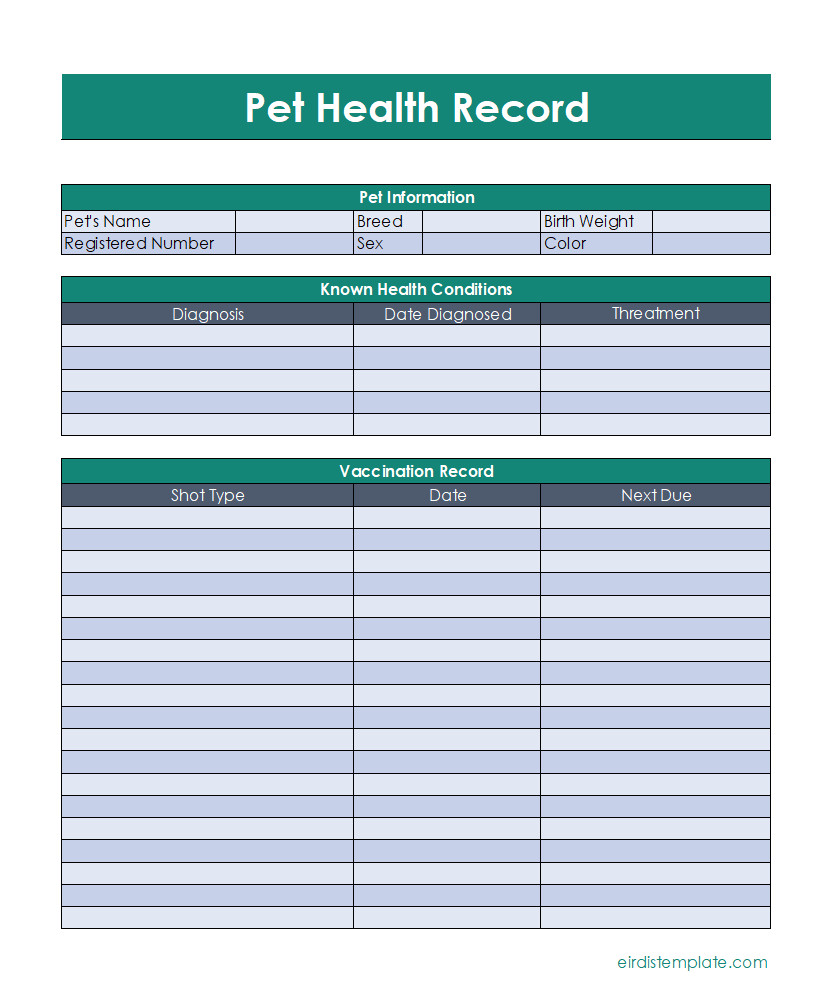
A pet health record is a document that contains all the important information about your pet’s veterinary visits, including assessments, diagnoses, and treatments. It serves as a comprehensive record of your pet’s medical history and is an essential tool for both you and your veterinarian to keep track of your pet’s health and well-being.
Having a pet health record allows you to easily access and share your pet’s medical information whenever necessary. It provides a detailed account of your pet’s health journey, enabling you to make informed decisions about their care and ensuring that they receive the appropriate treatment.
Why Is Your Pet’s Historical Health Record Important?
Your pet’s historical health record is important for several reasons:
- Continuity of Care: A pet health record allows different veterinarians to have a complete understanding of your pet’s medical history, ensuring continuity of care. This is especially important if you move or switch veterinarians.
- Early Detection: By keeping track of your pet’s health over time, you can identify any patterns or changes in their condition. This allows for early detection of potential health issues, leading to timely interventions and better outcomes.
- Treatment Planning: A comprehensive health record helps veterinarians develop effective treatment plans tailored to your pet’s specific needs. It provides valuable insights into previous treatments and outcomes, guiding future decisions.
- Emergency Situations: In emergency situations, having a pet health record readily available can be lifesaving. It ensures that emergency caregivers have access to crucial information about your pet’s medical history, allergies, and medications.
How to Keep Your Pet’s Records Organized
Keeping your pet’s records organized is essential for easy access and efficient management. Here are some tips to help you keep your pet’s records in order:
- Create a Dedicated Folder: Designate a specific folder or binder to store all your pet’s health records. Keep it in a safe and easily accessible place.
- Include Important Information: Make sure to include your pet’s basic information, such as their name, breed, date of birth, and microchip number, at the beginning of the record.
- Use Clear Labels: Clearly label each document with the date, type of visit (e.g., annual check-up, vaccination), and the veterinarian’s name.
- Organize Chronologically: Arrange the documents in chronological order, starting with the most recent visit at the top. This makes it easier to track your pet’s health progress over time.
- Keep Copies of Lab Results: If your pet has undergone any laboratory tests, keep copies of the results in the health record. These can provide valuable insights into your pet’s overall health.
- Update Regularly: As your pet visits the veterinarian, make sure to update their health record with new assessments, diagnoses, and treatments. This keeps the record current and accurate.
- Make Digital Backups: Consider making digital copies of your pet’s health record as a backup. This can be useful in case the physical record gets lost or damaged.
By following these organizational tips, you can ensure that your pet’s health records are easily accessible and well-maintained, making veterinary visits and healthcare decisions more efficient.
How Can I Make My Pet Happy And Healthy?
Maintaining your pet’s health goes beyond just keeping their veterinary records organized. Here are some tips to keep your pet happy and healthy:
- Nutritious Diet: Provide your pet with a balanced and nutritious diet that meets their specific needs. Consult your veterinarian for dietary recommendations.
- Regular Exercise: Engage in regular physical activities with your pet to keep them active and maintain a healthy weight. Exercise also helps promote mental stimulation.
- Preventive Care: Schedule regular check-ups with your veterinarian to ensure your pet receives necessary vaccinations, parasite prevention, and dental care.
- Mental Stimulation: Provide your pet with toys, puzzles, and interactive games to keep their minds engaged and prevent boredom.
- Grooming: Regular grooming, including brushing, bathing, and nail trimming, helps maintain your pet’s hygiene and overall well-being.
- Emotional Well-being: Spend quality time with your pet, offering affection, attention, and a safe and comfortable environment.
- Socialization: Expose your pet to different environments, people, and animals to enhance their social skills and prevent behavioral issues.
- Monitoring Health: Keep an eye out for any changes in your pet’s behavior, appetite, or bathroom habits. Report any concerns to your veterinarian promptly.
By incorporating these practices into your pet’s routine, you can promote their overall happiness and well-being, ensuring a long and healthy life.
Free Pet Health Record Template!
Keep your pet’s health history organized with our pet health record template in Excel! This tool allows you to track vaccinations, vet visits, medications, and more, all in one place. Perfect for pet owners and caregivers, it ensures comprehensive health management.
Use now to stay on top of your pet’s well-being!
Pet Health Record Template – Excel
- Month-to-month Lease Agreement Template - March 4, 2026
- Monthly Profit And Loss Statement Template - March 2, 2026
- Free Nurse Resignation Letter Template (Word) - February 28, 2026